This past weekend, I was able to attend the Boston Festival of Indie Games – and it was a blast! In this post, I’ll briefly discuss some interesting (and mildly concerning) observations from the conference as they relate to the game audio industry – and name my pick for best game audio at the conference.
Observation #1: Lots of Indie Video Games, Lots of Opportunities!
Seriously. There were a LOT of games. Not only that – there were a lot of UNIQUE video games. Alien make-out simulator? Check. Stealth platform game centered around the American Revolution? Check. Steampunk train-themed rail shooter? Check. There was no shortage of creative game ideas at Boston FIG this year, and this is good news for anyone in the video game music/sound camp. Lots of different ideas means that there is a wide array of video game music genres/styles needed – and that’s a good thing for composers.
My point with Observation #1 is that you should know your strengths, lean into those strengths, and find projects that fit well with your strengths. Don’t be afraid to be laser-focused! Many people feel that honing in too much on a specific style will hurt their chances for landing gigs, because specializing takes them out of the running for anything that doesn’t fit the bill. While it’s technically true that you’d appeal to a smaller subset of the gaming industry, you will be much more appealing to that subset than you would’ve been otherwise.
Ever play an MMORPG? In World of Warcraft, I played as a Druid – which meant I had a lot of options. I could be a Tank, Melee Damage, Ranged Damage, or Healer… technically. I decided to specialize in Ranged Damage, and although I could technically cast several healing spells, I was not a viable substitute for a real Healer. I tried it several times, and it often got everyone killed because I didn’t have the armor, weapons, or abilities that a real Healer needed to get the job done. Whenever I lost focus on my specialty – Ranged Damage – I would end up being a shitty Healer and a shitty Ranged Damage player at the same time. Until I figured that out, I had a tough time even finding a group that wanted me to come along for the ride. One look at my character’s gear could tell the story: I either looked like a Healer, Ranged Damage, or neither.
Don’t be an indecisive Druid – be a specialist.
Observation #2: Lots of Early-Build Indie Games Have Audio Already
Alpha-build games had music and sound. Some games weren’t playable at the conference, but had audio either in their trailers or on their websites. While I couldn’t hear every game’s audio (it was a very loud room, and only some games offered headphones), I was happy to have the chance to get a taste of the full playing experience with so many indie games! It was exciting to see that many developers had incorporated music and sound earlier in their development process than, say, the final month before release. Not that we’ve ever heard of that happening, right?
On a related note, I asked a lot of developers where they found the composer or sound designer for their game, and a lot of them explained that they found their composer/sound designer through a personal connection or relationship. It’s beneficial to get into the mix early if you want to have a chance at landing the gig. Keep this in mind when you’re networking, and even if you miss the wave on their current project you should continue building your relationship with developers you’d like to work with. Build rapport, be supportive of their endeavors, and engage with them in fun conversations. Pretend you’re a human trying to befriend another human. Eventually, they will release their current game and start on the next one.
Observation #3: Some Indie Games Might Fail
This may sound a little judgmental or pessimistic, but I would confidently bet on a small handful of those games failing commercially – and I arrived at this conclusion very quickly after speaking with the developers. I could be wrong, but in talking with a few devs there were some red flags on the showroom floor that were as loud and clear as the “!” sound from Metal Gear Solid. Some developers were trying to take on most or all of the game creation process themselves in addition to the coding – including major disciplines like marketing, 3D art, and even music. Some didn’t really have a strategy for getting their game adopted or sold.
I think that game designers are very much like other artists at their core, and they learn programming as the medium for expressing their creativity. Unfortunately, taking on too many unique creative disciplines will almost always hinder the success of the game unless the game is incredibly simple. Tiny Wings worked because the scope was kept very small, so a single person was able to pull it off. Many game designers have visions far exceeding something like Tiny Wings, and the chances of effectively executing across every creative area are incredibly slim for the scope of most games. It’s just too much, and while some people might be able to do it, this doesn’t mean that they should do it. If it’s purely a passion-project, then that’s another story – it’s like composing music for the fun and joy of it.
To get to the point of Observation #3, all I’m trying to say is: be careful. Put on your business hat for a minute before signing a contract. Talk to the developers about their progress, their plans, and their team. Do they sound like they’re spread too thin? Do they have a strategy for taking their game to market? Do you care if the game succeeds or fails after your work is complete? These are important things to know when negotiating a contract – especially if any of your compensation is dependent on game sales. If the game development team sounds a little too scattered, it’s safer for the composer to request a flat fee or per-minute rate on a shorter payment schedule. Working on a low-paying game that either fizzles before release or flops after release will leave you with an unfinished game credit, and the folks who are less likely to succeed will probably be more difficult to work with. I’m not saying you should try to avoid any risk of failure or keep your portfolio 100% void of unreleased games, because you can’t – even great games and great teams will fail sometimes. With this in mind, you should always do your best to mitigate risk in your career. Depending on your career goals, sometimes it’s better to turn a project down and scrape by for a month or two so that you can spend your time finding the next gig worth taking.
Video Game Music Academy’s Pick for Best Audio at Boston FIG 2014 – Airscape: Fall of Gravity!
In this platformer, you are a lost Octopus in a strange world full of danger, obstacles, and questionable physics. Love it. While I couldn’t find a gameplay link, you can download the first 6 levels of Airscape for Windows on Steam. The video on their homepage doesn’t do the audio justice compared to what I heard while playing the game at Boston FIG, but take my word for it: the audio in the demo was fantastic. Sam Gossner provides the music and sound for Airscape, and the two compliment each other beautifully. The sound effects are understated and endearing, and they don’t interfere with the gentle nature of the music or level environment. The music is playful, whimsical, and perfectly matched to the game’s aesthetic. I can tell that this is going to be one of those games that I’ll play just because the experience is so damned pleasant (and I always try to help an Octopus in need).
The gameplay itself offers some interesting gravity mechanics that make it as fun as it is treacherous. The spacial awareness required to progress through the first level reminded me of the first time I played Super Mario 64, which forced my 7th grade brain and motor skills to recalibrate for a yet-to-be-experienced repertoire of gameplay physics.
Save an Octopus, Play the demo.
Honorable Mentions:
Gemini – Music & Sound by Zack Zhang
Super Rad Raygun – Music by FantomenK
Did you go to Boston FIG this year? What did you think of the games and the audio? Do you have any other observations or opinions to add to the conversation? If so, share in the comments – I’m interested to hear your thoughts!
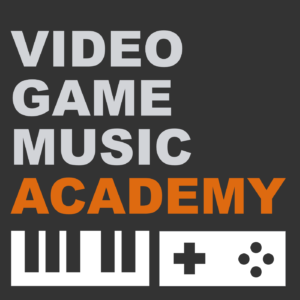
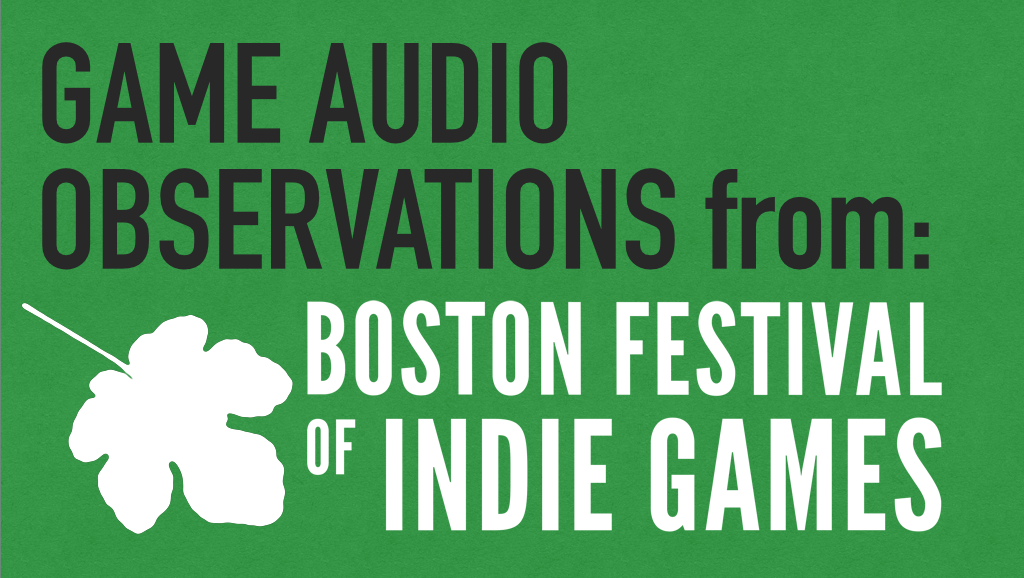


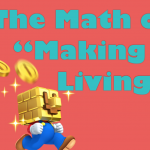
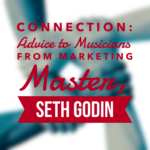
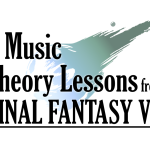
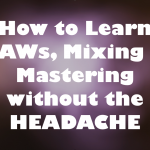



“I could be wrong, but in talking with a few devs there were some red flags on the showroom floor that were as loud and clear as the “!” sound from Metal Gear Solid.”
That reference, right there, is why I love reading your posts.
Getting a lot of good information out of this. Keep up the good work!
I try to keep it real 🙂
Thanks so much for reading, and the kind words!